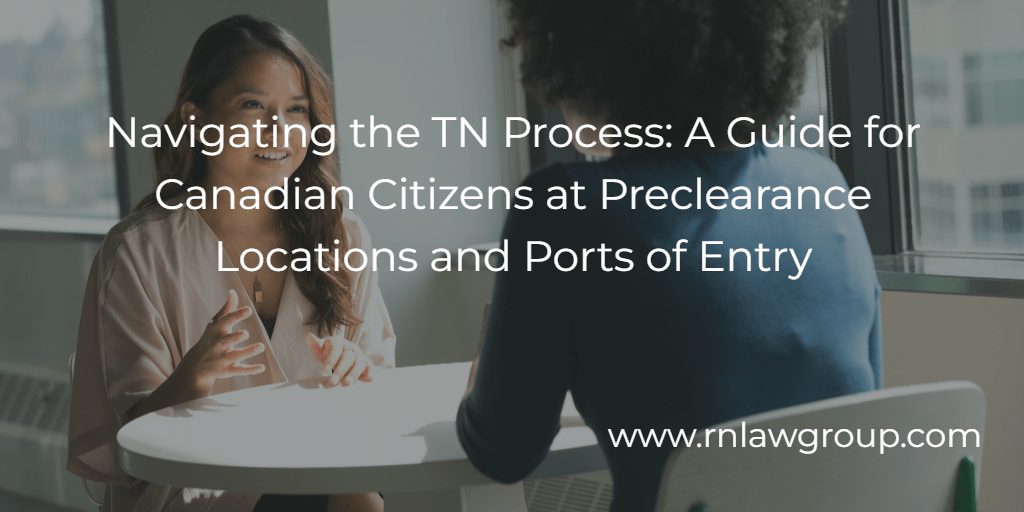
Navigating the TN Process: A Guide for Canadian Citizens at Preclearance Locations and Ports of Entry
Introduction to TN Classification for Canadians
Canadian citizens have a unique pathway to work in the United States through the TN classification, a component of the United States-Mexico-Canada Agreement (USMCA). Unlike other nonimmigrant visas, Canadians usually do not need a pre-issued visa to enter the U.S. for TN purposes. Instead, they apply directly at preclearance locations or ports of entry. This comprehensive guide aims to prepare Canadian TN applicants for their interaction with U.S. Customs and Border Protection (CBP) officers.
Understanding the TN Category
The TN classification permits Canadian professionals to work in the U.S. in specific designated professions. It is intended for temporary professional engagements, emphasizing the non-immigrant intent of the applicant.
Professions and Qualifications under TN Status
The TN category encompasses various professions, each with distinct educational and licensure requirements:
General
Accountant Baccalaureate or Licenciatura Degree; or C.P.A., C.A., C.G.A. or C.M.A.
Architect Baccalaureate or Licenciatura Degree; or state/provincial license
Computer Systems Analyst Baccalaureate or Licenciatura Degree; or PostSecondary Diploma or Post-Secondary Certificate, and three years experience
Disaster Relief Insurance Claims Adjuster (claims Adjuster employed by an insurance company located in the territory of a Party, or an independent claims adjuster) Baccalaureate or Licenciatura Degree, and successful completion of training in the appropriate areas of insurance adjustment pertaining to disaster relief claims; or three years experience in claims adjustment and successful completion of training in the appropriate areas of insurance adjustment pertaining to disaster relief claims
Economist Baccalaureate or Licenciatura Degree
Engineer Baccalaureate or Licenciatura Degree; or state/provincial license
Forester Baccalaureate or Licenciatura Degree; or state/provincial license
Graphic Designer Baccalaureate or Licenciatura Degree; or PostSecondary Diploma or Post-Secondary Certificate, and three years experience
Hotel Manager Baccalaureate or Licenciatura Degree in hotel/restaurant management; or Post-Secondary Diploma or Post-Secondary Certificate in hotel/restaurant management, and three years experience in hotel/restaurant management
Industrial Designer Baccalaureate or Licenciatura Degree; or PostSecondary Diploma or Post-Secondary Certificate, and three years experience
Interior Designer Baccalaureate or Licenciatura Degree; or PostSecondary Diploma or Post-Secondary Certificate, and three years experience
Land Surveyor Baccalaureate or Licenciatura Degree; or state/provincial/federal license
Landscape Architect Baccalaureate or Licenciatura Degree
Lawyer (including Notary in the Province of Quebec) LL.B., J.D., LL.L., B.C.L. or Licenciatura Degree (five years); or membership in a state/provincial bar
Librarian M.L.S. or B.L.S. (for which another Baccalaureate or Licenciatura Degree was a prerequisite)
Management Consultant Baccalaureate or Licenciatura Degree; or equivalent professional experience as established by statement or professional credential attesting to five years experience as a management consultant, or five years experience in a field of specialty related to the consulting agreement
Mathematician (including Statistician)5 Baccalaureate or Licenciatura Degree
Range Manager/Range Conservationalist Baccalaureate or Licenciatura Degree
Research Assistant (working in a post-secondary educational institution) Baccalaureate or Licenciatura Degree
Scientific Technician/Technologist6 Possession of (a) theoretical knowledge of any of the following disciplines: agricultural sciences, astronomy, biology, chemistry, engineering, forestry, geology, geophysics, meteorology or physics; and (b) the ability to solve practical problems in any of those disciplines, or the ability to apply principles of any of those disciplines to basic or applied research
Social Worker Baccalaureate or Licenciatura Degree
Sylviculturist (including Forestry Specialist) Baccalaureate or Licenciatura Degree
Technical Publications Writer Baccalaureate or Licenciatura Degree; or PostSecondary Diploma or Post-Secondary Certificate, and three years experience
Urban Planner (including Geographer) Baccalaureate or Licenciatura Degree
Vocational Counsellor Baccalaureate or Licenciatura Degree
Medical/Allied Professional
Dentist D.D.S., D.M.D., Doctor en Odontologia or Doctor en Cirugia Dental; or state/provincial license
Dietitian Baccalaureate or Licenciatura Degree; or state/provincial license
Medical Laboratory Technologist Baccalaureate or Licenciatura Degree; or PostSecondary Diploma or Post-Secondary Certificate, and three years experience
Nutritionist Baccalaureate or Licenciatura Degree
Occupational Therapist Baccalaureate or Licenciatura Degree; or state/provincial license
Pharmacist Baccalaureate or Licenciatura Degree; or state/provincial license
Physician (teaching or research only) M.D. or Doctor en Medicina; or state/provincial license
Physiotherapist/Physical Therapist Baccalaureate or Licenciatura Degree; or state/provincial license
Psychologist State/provincial license; or Licenciatura Degree
Recreational Therapist Baccalaureate or Licenciatura Degree
Registered Nurse State/provincial license; or Licenciatura Degree
Veterinarian D.V.M., D.M.V. or Doctor en Veterinaria; or state/provincial license
Scientist
Agriculturist (including Agronomist) Baccalaureate or Licenciatura Degree
Animal Breeder Baccalaureate or Licenciatura Degree
Animal Scientist Baccalaureate or Licenciatura Degree
Apiculturist Baccalaureate or Licenciatura Degree
Astronomer Baccalaureate or Licenciatura Degree
Biochemist Baccalaureate or Licenciatura Degree
Biologist8 Baccalaureate or Licenciatura Degree
Chemist Baccalaureate or Licenciatura Degree
Dairy Scientist Baccalaureate or Licenciatura Degree
Entomologist Baccalaureate or Licenciatura Degree
Epidemiologist Baccalaureate or Licenciatura Degree
Geneticist Baccalaureate or Licenciatura Degree
Geologist Baccalaureate or Licenciatura Degree
Geochemist Baccalaureate or Licenciatura Degree
Geophysicist (including Oceanographer in Mexico and the United States) Baccalaureate or Licenciatura Degree
Horticulturist Baccalaureate or Licenciatura Degree
Meteorologist Baccalaureate or Licenciatura Degree
Pharmacologist Baccalaureate or Licenciatura Degree
Physicist (including Oceanographer in Canada) Baccalaureate or Licenciatura Degree
Plant Breeder Baccalaureate or Licenciatura Degree
Poultry Scientist Baccalaureate or Licenciatura Degree
Soil Scientist Baccalaureate or Licenciatura Degree
Zoologist Baccalaureate or Licenciatura Degree
Teacher
College Baccalaureate or Licenciatura Degree
Seminary Baccalaureate or Licenciatura Degree
University Baccalaureate or Licenciatura Degree
“State/provincial license” and “state/provincial/federal license” mean a document issued by a state, provincial, or federal government, as the case may be, or under its authority, but not by a local government, that permits a person to engage in a regulated activity or profession.
“Post-Secondary Diploma” means a credential issued, on completion of two or more years of postsecondary education, by an accredited academic institution in Canada or the United States.
“Post-Secondary Certificate” means a certificate issued, on completion of two or more years of postsecondary education at an academic institution, by the federal government of Mexico or a state government in Mexico, an academic institution recognized by the federal government or a state government, or an academic institution created by federal or state law.
Preparation for TN Application at Ports of Entry
Gathering Documentation
It is essential to prepare documentation, including a valid Canadian passport, an employment letter from a U.S. employer, and relevant educational and professional credentials. ORIGINAL education documents should be presented.
Crafting Your Presentation to the CBP Officer
Although it may seem important to have a ton of paperwork, this is not the primary concern. Applicants should be ready to clearly articulate the nature of their professional role, the duration of their contract or employment, and their reasons for returning to Canada.
The purpose of the interview is for the officer to learn more about you and your goals. They want to be certain that you are telling the truth and that you have sincere intentions when you come. Though useful at times, documents are best thought of as supporting characters in a film. What you say in the interview can be supported by them.
Still, the documents don’t steal the show. The way you respond to questions during the interview is what matters most. The officer wants to know if you look reliable and credible, and if the information you provide matches what is on your paperwork. They want to confirm that you are not attempting to utilize the visa for purposes other than those for which it was intended.
So keep in mind that, even if having the necessary paperwork with you can be helpful, the interview is the main component that will determine whether or not you are granted a visa. During the interview, be transparent about your ambitions, exude confidence, and tell the truth.
Prepare an Elevator Pitch
Having a succinct and concise “elevator pitch” ready is quite beneficial when describing your trip to a CBP officer. This is an easy formula to use when writing your elevator pitch:
Introduction: Start with a friendly greeting. Mention your name.
Give your primary motivation for visiting the United States in your purpose statement. Be precise and succinct.
Details: Give a succinct justification of your goal or a few important specifics. Bring up any pertinent ties, such as those to family, employment, or a particular occasion.
Duration: State how long you intend to remain in the United States. If appropriate, describe why you require that length of time.
Return Strategy: State that you intend to go back to your nation of origin. Describe your motivation for returning.
Putting it all together, here’s an example:
“Hello, my name is [Your Name] and I would like to apply for admission in TN status. I have secured a position as a Software Engineer with [U.S. Company/Organization Name] in [U.S. City]. This role offers me the opportunity to work on cutting-edge software development projects, enhancing my expertise in [specific software technologies or areas of software engineering]. My contract is for [duration of contract], after which I plan to return to Canada. I have been working in the software engineering field for [Time], currently employed at [Current Company/Organization Name] in Canada. This U.S. opportunity is a significant step in my professional growth, allowing me to contribute uniquely to [U.S. Company’s] goals while further developing my skills.”
Remember to keep your elevator pitch concise and under a minute, focusing on the key points: your role, the temporary nature of your stay in the U.S., and your intent to return to Canada. Practicing it several times will help you present confidently and clearly to the CBP officer.
Anticipating Questions from CBP Officers
Common questions during the CBP interaction include:
What is the purpose of your trip to the United States?
Can you tell me about the company/organization you’ll be working for in the U.S.?
What is your role or position within the company?
How long do you plan to work in the U.S.?
Do you have any previous experience in this field?
Can you explain how your work in the U.S. is related to your qualifications and experience?
What ties do you have to your home country that will ensure your return after your work in the U.S.?
These questions aim to assess the applicant’s qualifications, intentions, ties to Canada, and overall eligibility for the TN category.
Maintaining Composure and Clarity
The key to a successful CBP interaction is clear, honest communication. Applicants must convey their intent to work temporarily in the U.S. and maintain a residence in Canada.
Strategies for a Successful TN Visa Process
Understanding CBP Interview Dynamics
The CBP interview is crucial for assessing the applicant’s eligibility and intentions. Officers evaluate professional qualifications, the temporary nature of the intended stay, and ties to Canada.
Tips for a Successful CBP Interaction
Be Prepared: Know the details of your job offer and how it aligns with TN visa requirements.
Be Honest: Provide truthful and consistent answers to the officer’s questions.
Be Clear: Communicate your intentions and plans confidently and directly.
Conclusion
Navigating the TN application process requires careful preparation, a thorough understanding of the requirements, and clear communication. Canadian professionals must familiarize themselves with the specific requirements of their profession and prepare for the CBP interaction. By doing so, they can successfully manage their TN application and confidently approach CBP officers at ports of entry.
By: Emily Neumann
Emily Neumann is Managing Partner at Reddy Neumann Brown PC with over 15 years of experience practicing US immigration law providing services to U.S. businesses and multinational corporations. Emily has helped transform the firm from a solo practice to Houston’s largest immigration law firm focused exclusively on U.S. employment-based immigration. She received her Bachelor’s degree in Biology from Central Michigan University and her Juris Doctorate degree from the University of Houston Law Center. Emily is a frequent speaker and has been quoted in Bloomberg Law, U.S. News & World Report, Inside Higher Ed, and The Times of India on various hot topics in immigration. She is a member of the American Immigration Lawyers Association and Society for Human Resource Management.
Reddy & Neumann has been serving the business community for over 25 years and is Houston’s largest immigration law firm focused solely on US. Employment-based immigration. We work with both employers and their employees, helping them navigate the immigration process quickly and cost-effectively.

